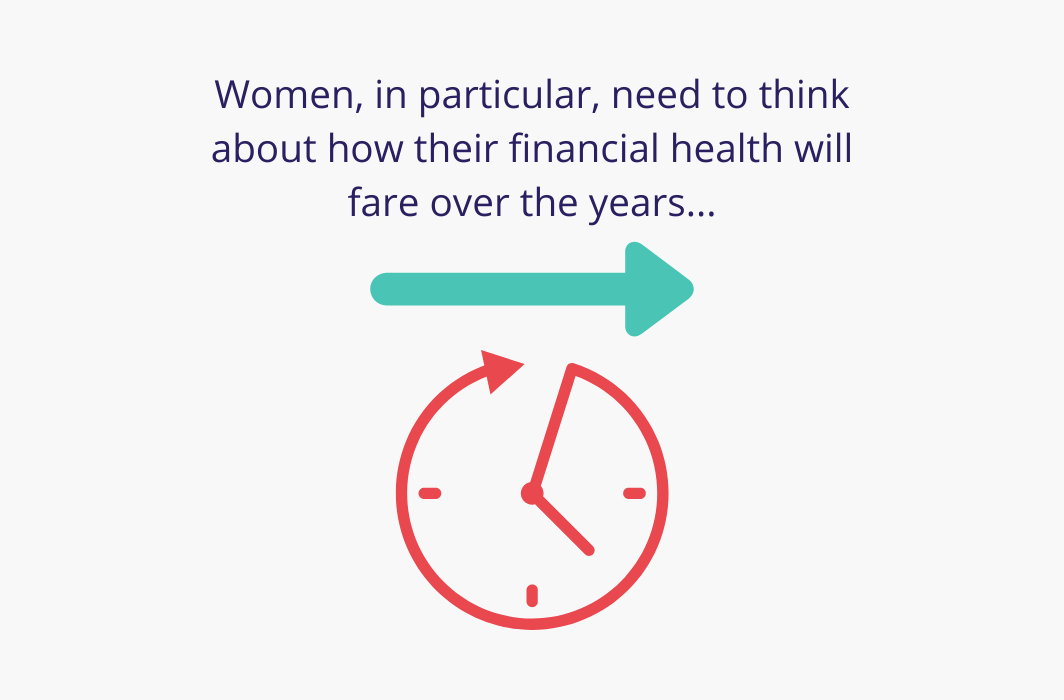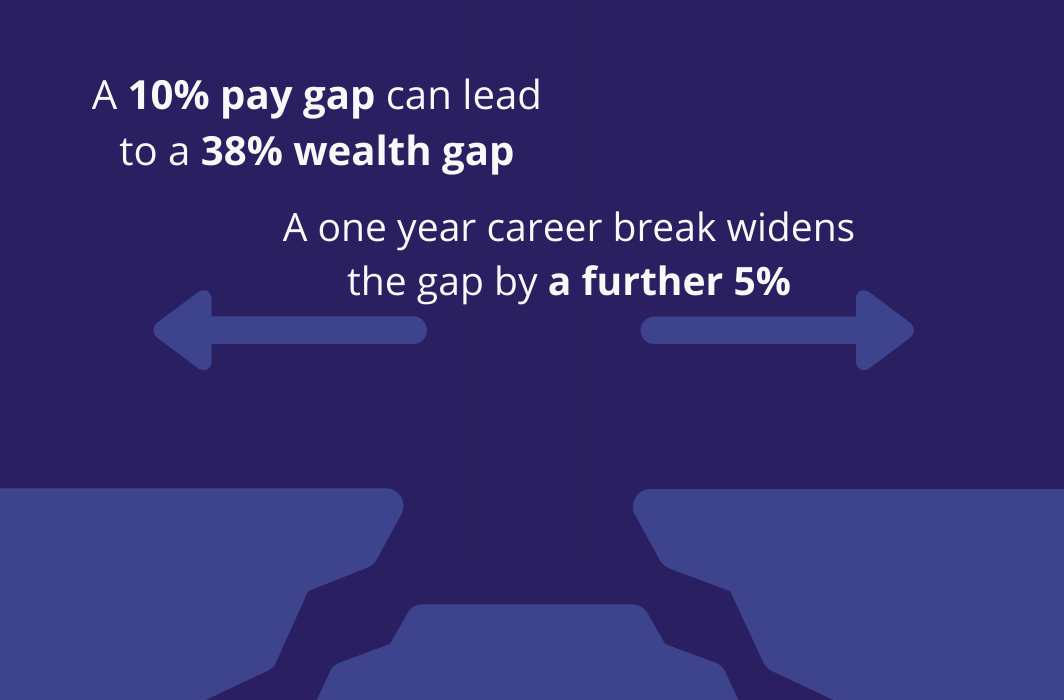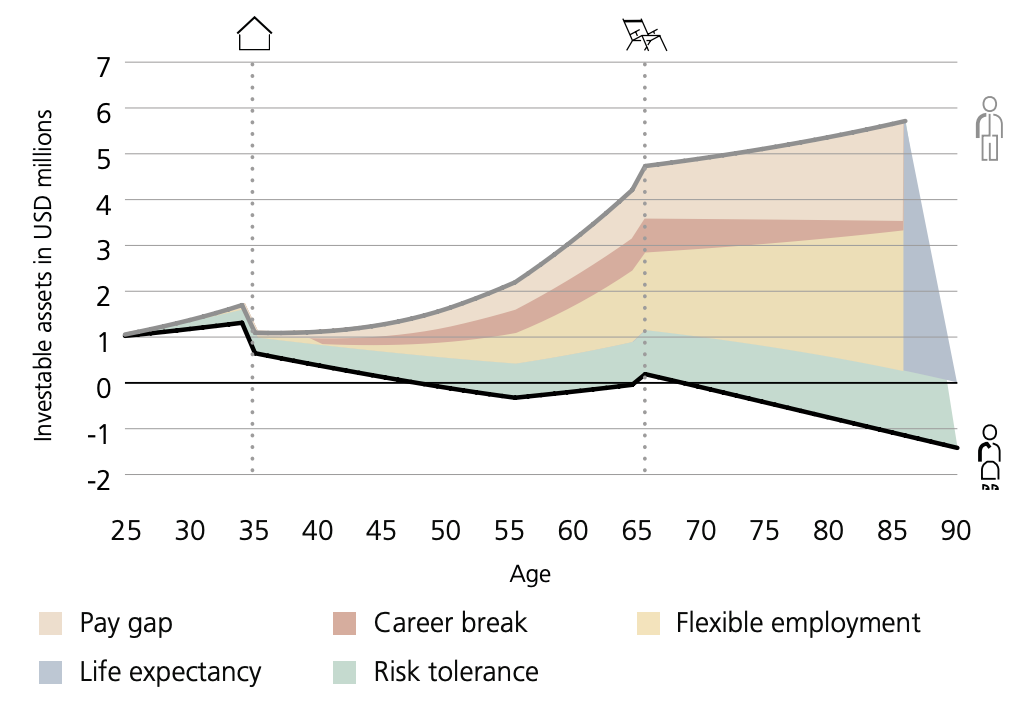It's important to remember that money is a tool.
Too often, it's a tool that we don't know how to wield or one that makes us feel self-conscious and confused.
This is particularly problematic for women, who have long been shut out of the finance world and taught to be cautious savers, not savvy investors.
In this lesson, you'll learn:
- What financial health means.
- How to think about financial health the way you do physical fitness.
- How the financial health between men and women differs.
Listen to this article.

You may feel a step or two behind right now. Still, the fact that you're reading about financial planning is a great sign that you're serious about being a financially healthy person.
When we talk about 'financial health', we're talking about someone's personal financial situation. This includes savings, retirement accounts, spending & investing. Everyone has slightly different gauges for understanding their financial health because we each have different financial needs.
A weightlifter and a runner can look different but be equally healthy - they just flex their muscles in different ways!
Money is to my social existence what health is to my body.
Put your financial health in the context of physical health.
People approach exercise in ways that make sense to them. You should do the same with your finances.
Think about what goals you have and how you can change your money to help achieve them.
We will cover how to define your life goals and the money you need to achieve them later.

Women tend to live longer than men, and today’s young women can expect to work until they are 70. But women are often penalised for taking time out of work to have children or to care for elderly or sick family.
Suppose you ask for a flexible work schedule to meet demands at home. In that case, you may be seen as less essential to your teams, something that can manifest itself through a lack of bonuses or stagnant wages.
These "breaks" women take in their careers contribute to the gender pay gap, which is currently not predicted to close until 2050.
Six out of every ten young women are worrying about their finances at least once a week.
Getting comfortable with your financial health will allow you to help your friends, family and colleagues through meaningful discussions and thought-provoking questions.
These small changes in knowledge & confidence all add up, and hopefully, they will help future generations access more financial independence.
The increasing contribution of women to the global economy has seen tremendous benefits.
Empowering women and creating more financial equality is essential for helping societies and economies thrive.
Over the years, gender equality has meant an equal education and an equal say in governance. Still, today, it also means economic freedom, helping grant women greater control over their lives.
Take control of your own financial health:
- Write down three reasons that stop you from taking control of your financial health.
- Write down three goals to help you start taking control of your financial health.
- Put your list of goals somewhere you'll see them every day!
Women are additionally left behind in their investments because of different risk attitudes:
Women tend to invest more conservatively than men; they have long been taught to be cautious savers, not risky investors.
Something that feels small, like the difference of a 1% investment return to a 3% return, will make a massive difference in the long run, leaving a cautious investor much less wealthy in the future.

Comparing the finances of a man and woman during their lifetimes.
UBS calculated a robust simulation showing how certain events and issues can affect a woman's wealth.
- A 10% pay gap can lead to a 38% wealth gap.
- A one-year career break widens the gap by further 5%.
- Part-time work slows down wealth creation dramatically.
- Choosing an investment that is less 'risky' (a lower volatility) leads to a wealth that does not grow as fast.
(Source: UBS)

Key takeaways.
Think about your financial health like you think about your physical fitness - both are personal. Both require regular attention, and both only improve if you start doing something about them!
The typical life paths of women and men lead to significant and widening wealth gaps between them over the lifetime.
With this in mind, review your mental stances towards money, investing and risk and try to discern what's holding you back from tackling these areas.
What comes next?
In our next lesson, we will take a closer look at whether you really need money to be happy, and what the two ideas have in common.
Discover more
-
Do you need money to be happy?
In this level, we’ll look at how money can contribute to your happiness (and the ways in which it can’t). Historically, money wa... -
What are the hidden meanings of your money?
Let's examine your unquestioned assumptions about money and its role in your life. It’s very likely that “your” personal beliefs a...

